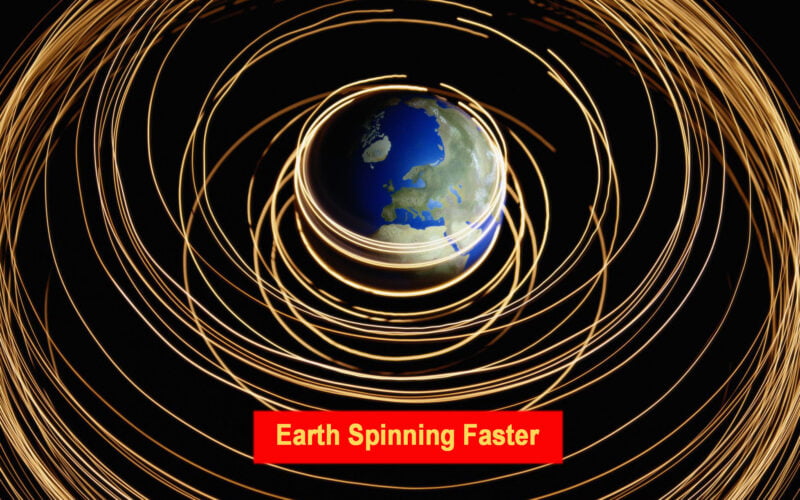
In recent times, there has been increasing buzz and speculation about the Earth spinning faster than before. People around the world have noticed subtle changes in their daily lives, such as shorter days and an altered perception of time. This article delves into the phenomenon of the Earth spinning faster, exploring its causes, implications, and the scientific community’s insights.
The notion of the Earth spinning faster refers to a perceived increase in the planet’s rotational speed. The Earth completes one full rotation on its axis in approximately 24 hours, resulting in day and night cycles. However, several factors can influence the Earth’s rotation speed, leading to deviations from this standard time frame.
Gravity plays a significant role in determining the Earth’s rotation speed. The gravitational pull exerted by the Moon and the Sun affects the distribution of mass on our planet. As the Moon orbits the Earth and the Earth orbits the Sun, gravitational interactions create tidal forces that can influence the rotational speed.
Geophysical events, such as earthquakes and volcanic eruptions, can impact the Earth’s rotation. These events involve the redistribution of mass, altering the planet’s moment of inertia and affecting its rotational speed. While individual events may not cause significant changes, the cumulative effect of multiple events can have a measurable impact.
Climate change, another crucial factor, can affect the Earth’s rotation. The melting of glaciers and polar ice caps redistributes massive amounts of water across the planet. This redistribution alters the Earth’s mass distribution and causes changes in its rotation speed.
One of the most noticeable consequences of the Earth spinning faster is the perceptible change in the length of days. As the rotation speed increases, the days become shorter. While this change may seem insignificant on a daily basis, over time, it accumulates and affects various aspects of life, including daily routines and human perception of time.
The Coriolis effect, a phenomenon resulting from the Earth’s rotation, affects the movement of air masses, ocean currents, and projectiles. With an increase in rotational speed, the Coriolis effect becomes more pronounced, influencing weather patterns and oceanic currents. These changes can have far-reaching implications for climate and weather systems.
The Earth’s rotation speed is closely monitored by timekeeping institutions worldwide, such as the International Earth Rotation and Reference Systems Service (IERS). If a significant deviation in the rotation speed is detected, adjustments are made to maintain accurate timekeeping. These adjustments include the addition or subtraction of leap seconds to the Coordinated Universal Time (UTC).
A1: The Earth rotates at an approximate speed of 1670 kilometers per hour (km/h) at the equator. However, this speed decreases as you move closer to the poles.
A2: No, the Earth’s rotation speed does not affect the strength of gravity. Gravity is primarily determined by the mass of an object, not its rotation.
A3: While the Earth spinning faster may have short-term effects, such as shorter days, there are no significant long-term effects predicted at this time.
A4: Scientists measure the Earth’s rotation speed using precise instruments and techniques. One common method is through the use of Very Long Baseline Interferometry (VLBI), which involves observing distant celestial objects and their positions relative to the Earth. By analyzing these observations over time, scientists can determine the Earth’s rotation speed.
A5: The Earth’s rotation speed can vary from year to year, but the changes are usually very small and difficult to notice. While there have been recent reports of the Earth spinning slightly faster, it is important to note that these changes are within the range of normal fluctuations and do not indicate a significant long-term trend.
A6: The Earth’s rotation speed has subtle effects on our daily lives. The most noticeable impact is the slight change in the length of days, which can influence our routines and activities. However, these changes are gradual and typically do not disrupt our daily functioning.
The phenomenon of the Earth spinning faster has captivated the curiosity of many individuals worldwide. While there have been reports of slight increases in the Earth’s rotation speed, it is important to understand that these changes are within the realm of natural fluctuations. The Earth’s rotation speed is influenced by various factors, including gravitational forces, geophysical events, and climate change. These factors can cause slight deviations from the standard 24-hour day. However, the long-term implications of the Earth spinning faster are minimal, and our daily lives continue unaffected. As scientists continue to monitor and study this phenomenon, we gain further insights into the dynamic nature of our planet.
Recommended other topics: Facts About Black Holes










© InfoDoot. All Rights Reserved.